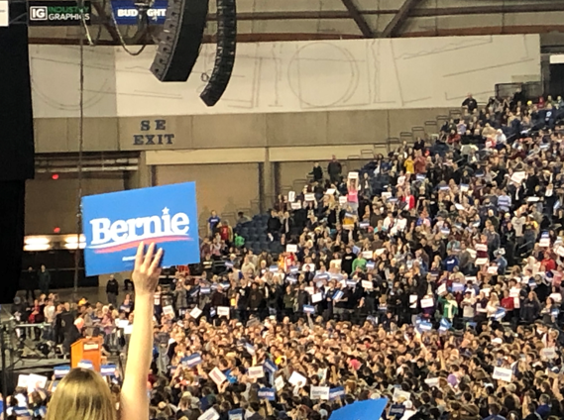By Gurjot Kang
For junior Pacific Lutheran University student and Psychology major Dexter Finn ’21, 2020 Democratic presidential candidate Bernie Sanders invigorated a passion for politics they hadn’t felt in a long time. It was Sanders’ powerful message of community and grassroots action that motivated them to attend his rally at the Tacoma Dome back in February of this year.
Finn was just one among a handful of PLU staff, students and alumni that chose to go to the rally on the cool and breezy Monday evening of Feb. 17. As they stood amid a crowd of more than 17,000 supporters, they could sense a rush of adrenaline pumping through their veins.
For Finn, Sanders’ campaign spoke directly to the social and political issues on the minds of many young college students across the country. College debt, climate change and universal healthcare were all familiar topics of discussion within their community of friends.
“Since being at PLU, I have seen just how stressed people get when they think about how they’re going to pay off their student debt,” Finn said. “People panic about aging out of their parents’ insurance and not finding a good enough paying job to cover the costs of living here, or anywhere for that matter.”
For students like Finn, Sanders’ bid for president was more than a campaign, it symbolized a movement. His campaign slogan of “Not Me, Us,” aimed to unite young, diverse, working class voters of all backgrounds against the ‘democratic establishment’ by championing progressive policy platforms, like Medicare for All.
“I think Bernie has done a lot to move the party towards issues that are more pressing to college students today. We all worry about our student debt, finding a job when we graduate, and paying for our own health insurance; topics Bernie has consistently addressed throughout all his political campaigns,” Finn said.
While Sanders gained momentum in the democratic caucuses of early voting states like Iowa and Nevada, he wasn’t able to get young voters to the polls in the giant numbers he depended on to win the nomination. Michigan is a key example of this, according to a PBS NewsHour article from March 2020.
Although Sanders showed widespread support among young voters in Michigan, approximately 57 percent of adults between the ages 18 to 44, at the end of the day, it was the Biden voters age 45 and up that actually came out to vote in large droves.
The possible explanations for why Sanders was unable to move his crowd of young supporters to the polls range from lack of civic engagement to voter disenfranchisement. In comparison to the 2018 midterms, youth voter turnout decreased during the presidential primaries.
Amid the increasing pressures of a global pandemic on the U.S. healthcare system and economy, Sanders, unable to secure a significant delegate lead over former Vice President Joe Biden, ended his presidential bid on April 8.
This news arrived during a difficult time for many young college students, who were already struggling to pack up their dorm belongings and adjust their futures amid the disruptive outbreak of COVID-19.
“I was very disappointed when I heard Bernie dropped out of the presidential race. Without him, it felt like all the issues we value dissipated and no good candidates were left to choose from,” Finn said.
Despite Sanders’ announcement coming as a great upset to youth at PLU and afar, the Vermont senator’s impact on shifting the Democratic Party platform to a more progressive agenda, since 2016, can’t go unnoticed.
Though Sanders’ loss indicates that the young college-aged demographic isn’t a monolith, issues, such as student loan debt and healthcare, still impact us all.
For now, Finn struggles to keep Sanders’ message of unity alive and well in their heart.
“I have seen how the state of our world has put immeasurable pain and stress upon us and our potential future. But Bernie Sanders has always addressed these problems we college students face,” Finn said. “He does not work on creating a better place for himself and his generation; he works on creating a better place for all the generations that will come after him, even if he himself won’t be able to experience it.”



















